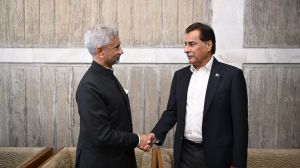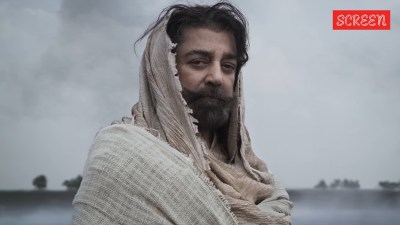Stay updated with the latest - Click here to follow us on Instagram
AIIMS trauma: Staggering numbers
With only 2,424 beds,750 faculty members and 35 operation theatres including the ones at AIIMS Trauma Centre the number of patients far overrides the available facilities.
With only 2,424 beds,750 faculty members and 35 operation theatres including the ones at AIIMS Trauma Centre the number of patients far overrides the available facilities.
Fifty six years after it was set up in the heart of the Capital as an apex medical teaching institute and referral centre,the All India Institute of Medical Sciences (AIIMS) has come to play a unique role in the healthcare system of the country.
As institute director Dr R C Deka puts it,AIIMS has acquired a brand value,which has made its present role far greater than what was originally envisioned.
With 26 lakh people being treated as out-patients,1.7 lakh admissions and 1.5 lakh surgical procedures in the last financial year alone,the demand for brand AIIMS,doctors said,has far outgrown the supply.
Dr Deka said,AIIMS was conceived as a teaching institute for producing faculty,contributing to research and as a tertiary-level referral centre for patients suffering from complicated disorders that could not be managed elsewhere. But today,we have walk-in patients from all over the country.
With only 2,424 beds,750 faculty members and 35 operation theatres,including the ones at AIIMS Trauma Centre,the number of patients overrides available facilities.
The institute is perhaps the only government hospital in the country where surgeons work well into the night,outpatient units run from dawn to dusk and resident doctors struggle to find hostel rooms on the campus at the cost of dispensing their housing allowances so they can be available on call 24X7.
Despite all these, waiting period for several interventions still stretch for many months sometimes to years. This,perhaps,is the biggest irony of the institutes existence.
Dr R V Azad,chief of the R P Centre for Ophthalmic Sciences at AIIMS,said,People accuse AIIMS of serving mostly the VIPs,but only 10 per cent of our patients are VIPs at any given time. Sixty per cent are walk-ins,who are among the poorest of the poor. This majority is willing to wait for as long as it takes as there is this relentless faith in getting treated in AIIMS.
The Numbers
An analysis of the last five years data from the medical records section shows that the super-specialty departments like cardiology and cardiothoracic surgery,neurosurgery and neurology,the three branches of oncology medical,surgical and radiation oncology constitute nearly 25 per cent of the admissions.
Add to this other specialties such as paediatrics,orthopaedics,nephrology,urology,gastroenterology,rheumatology and endocrinology,and the number is half the total admissions.
The specialty clinics in the medicine department alone including sleep disorders,geriatric medicine,renal medicine and chest disorders treated over 1.8 lakh patients annually over the past two financial years,while the general medicine OPD saw about 1.25 lakh patients annually. The ophthalmology OPD treated 2.2 lakh OPD patients last year and performed nearly 30,000 surgeries.
Dr B R Ambedkar Rotary Cancer Hospital (IRCH) with 182 beds,treated over 82,000 patients on OPD basis in the last financial year. Of this,a little over 8,500 were new patients. Cancer requires long-term intervention. So with our available facilities,we can accommodate very few new patients. More than 73,000 are already on our rolls, a senior professor of medical oncology said. Over 28,000 patients were admitted to the oncology wards in the past year,and more than 6,000 surgeries performed.
In the surgical disciplines,1.5 lakh people were treated on an average in the past three years. Of the 21,000 major surgical procedures at AIIMS,over 31 per cent were in the Cardio Neuro (CN) Centre,including 3,000 open heart procedures.
In total,the centre performed 70,000 surgeries. Nearly 30,000 eye surgeries were performed,and an additional 11,000 patients were operated upon for ENT procedures.
The Achievements
Despite its limited resources and high footfall,AIIMS has achieved many firsts in pioneering healthcare solutions. The institute started the countrys first IVF centre in a government hospital and has helped over 150 couples. The pharmacology department is the national coordinating centre for a pharmaco-vigilance programme to ensure safety of drugs.
Dr Y K Gupta,HoD of pharmacology,said,We are also the national centre for a programme to evaluate the heavy metal content in children’s toys.
The national eye bank is coordinated from the AIIMS ophthalmology department. The genetics unit of the paediatric department,dedicated to genetic counselling and detecting disorders in the foetus,has been recognised as a WHO centre of excellence for training in genetics research.
AIIMS was the first government institute to start laparoscopic procedures in 1991 and introduce the robotic surgeries. Many firsts have been achieved by AIIMS over the years in open-heart surgeries,and non-invasive brain surgeries.
The Problem
The steady flow of patients has put a huge burden on the existing 2,424 beds in AIIMS. While new 20-bed wards have been added in pulmonary medicine,geriatric medicine and surgical oncology,the shortage of beds is still perennial.
Dr M C Misra,HoD of Surgery,said,We have to prioritise patients for surgical procedures. We usually try to see that cancer patients are operated upon within two weeks of diagnosis. Hernia,gall bladder,urology procedures and removal of endocrine glands are pushed back.
Dr Misra said waiting periods for routine procedures stretches anywhere from 3 to 6 months.
The neurosurgery department with 25 ICU beds and 72 general beds treated over 21,000 new patients last fiscal. The waiting period for paediatric neurosurgery,tumour patients and specialties like brachial plaxis procedure (to reconstruct nerves of the shoulders) is over 500 days. For cranioplasty (surgical repair of the skull after injuries or congenital deformities),its about 200 days, a senior professor from the Department of Neurosurgery said.
But doctors have over the years,mastered the art of managing with available resources. In the 25-bed ICU in the neurosciences centre,2,960 patients 2,690 neurosurgical and 170 from neurology were managed in the last financial year.
Shortage of bed is most acute in the ICUs. Dr Deka said,ICU beds are so precious that there is always a perennial shortage. Many patients who are treated in other hospitals also wish to come to us if they fear their condition is worsening and they mostly need critical care.
Despite the huge volume of patients,the combined death rate has ranged between 2.5 per cent in 2008-09 and 3 per cent this year.
In super-specialty centres,the death rate is higher,as patients often come in a critical condition. The death rate was 6.3 per cent in gastrointestinal surgery and liver transplant,9.5 per cent in the cancer hospital,7.4 per cent in cardiothoracic centre and 6.5 per cent in neurosciences.
Outreach campus in Jhajjar helps ease burden
Under pressure from sheer numbers seeking treatment,AIIMS has been working on expansion plans for some time now. A new 300-acre outreach OPD campus in Jhajjar is ready. Last week,it held its first eye camp,in which over 4,000 patients were screened.
The departments of medicine,gynaecology and paediatrics will soon start operating OPD services on this campus. According to a senior official,the institute plans to shift its entire cancer hospital to Jhajjar and expand it to a 600-bed state-of-the-art facility,with 200 beds dedicated for clinical research.
Speaking at a press conference ahead of the AIIMS convocation on Tuesday,institute director Dr R C Deka said,We also plan to set up a dedicated OPD building in Masjid Moth,near the main AIIMS campus,and construct a separate surgical block to bring all surgical disciplines together.
Doctors said a new surgical block,with additional operation theatres will bring down the waiting period for many procedures and allow the institute to start surgeries in new disciplines.
The delay for procedures in general surgery can be brought down drastically,since we expect to double our surgeries after the new block comes up . It will have at least 200 beds and 12-14 operation theatres. We can also start doing surgeries for vascular disorders and lymphatic obstructions, Dr M C Misra,Chief of AIIMS Trauma Centre and HoD of Surgery,said.
The extension of AIIMS,with an additional Trauma Centre,was a huge boon,said doctors. In the last five years,after a separate Trauma Centre was started,we are helping far more accident victims than we could earlier, Dr Misra said.
The AIIMS Trauma Centre emergency saw a footfall of 50,000 patients over the last financial year. Of this,15,000 were admitted,and close to 5,000 major surgeries performed in orthopaedic and neurological trauma, Dr Misra said.
A dedicated neuro-trauma ICU and a separate orthopaedic trauma ICU has also been made operational at the AIIMS Trauma Centre.
New 20-bed wards are functional in the disciplines of geriatric medicine and pulmonary medicine. Administrative officials said efforts have also been made to ensure the volume of patients does not lead to any compromise in the quality of patient care.
We have started a strict hospital-based infection regulating committee. The crude infection rate has been 8.3 per cent this year,compared to 8.1 per cent last year. To control infections,we are trying to ensure only one attendant enters the ICU with every patient, Dr Deka said.
The institute has also created 150 posts of additional professors and filled 97 of these,to keep up with the intake in students due to the OBC reservations. Six new AIIMS-like institutes have been set up in different parts of the country and are starting admissions this year for MBBS. These institutes are yet to start their hospital facilities.
Dr R V Azad,chief of the ophthalmic sciences,said,The burden of patient care may not have allowed AIIMS to perform its envisioned role of research as much as was expected,but we have contributed to generating many new curricula of treatment.
In the last financial year,AIIMS managed to increase its extramural research grant from ICMR,Department of Biotechnology,and other external funding agencies,by 25 per cent,to a little over Rs 65 crore.
The faculty published 1,700 research papers in national and international journals last year,while 632 research projects are still underway. Research in stem-cell therapy,transplant immuno-genetics and genetic disorders are going on.
Super-specialty degree courses in several new disciplines,including surgical oncology,geriatric and pulmonary medicine have been started.
AIIMS doctors have participated in publishing international guidelines on hernia surgery.
Over the years,the proportion of referred cases has also increased to about 30 per cent of the total patients. This is an improvement. It means our original role as a tertiary referral-care centre is finally being acknowledged, Dr Azad said.







